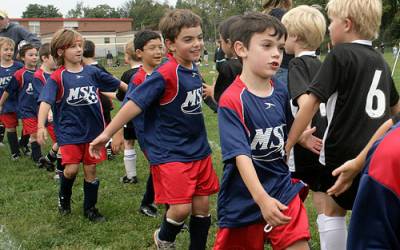SV Eagles
The Silicon Valley Eagles Soccer Academy blog is a great source of soccer coaching tips, parents and players improvement tips and advises, and updates on the soccer world news.
6 Ways to Help Your Kids Learn Sportsmanship
- Font size: Larger Smaller
- Hits: 4613
- Subscribe to this entry
- Bookmark
 Children gain so much from participating in sports, like the opportunity to develop physical literacy and the chance to make lasting friendships. Playing sports can also help kids become better people as they grow up. My soccer teams have always been known for good sportsmanship. Through the years, coaches and parents from other teams have often told me that they like to play my teams, even when we beat them in competition, because my kids are basically “nice.” That says something.
Children gain so much from participating in sports, like the opportunity to develop physical literacy and the chance to make lasting friendships. Playing sports can also help kids become better people as they grow up. My soccer teams have always been known for good sportsmanship. Through the years, coaches and parents from other teams have often told me that they like to play my teams, even when we beat them in competition, because my kids are basically “nice.” That says something.
What makes my players nice? In a nutshell, I coach them to play to win, but always honestly and fairly. Compete as athletes, train hard, and then win by using your superior skill, fitness and intelligence. Don’t compete with personal insults or dirty fouls or vulgar chants. We’re not about “winning at all costs.”
It’s about honoring everyone and learning what respect really means. Most people will agree that good sportsmanship means honoring everyone on the field of competition, including opponents, officials, parents, spectators and ourselves. However, not all kids learn this.
How can we teach our kids sportsmanship?
It’s really pretty simple. We need to recognize that kids imitate the significant adults in their lives. In their preschool and early elementary years, they learn their behavior in the same manner as dogs and ducklings—observation and imitation. It’s basic developmental psychology. With this in mind, here are six tips to teaching sportsmanship to kids:
Decide what you value.
Decide what sportsmanship means to you—as a sport parent, and as someone who understands that your child’s lessons in the sporting arena will transfer into their larger worldview.
Talk with your child.
When issues arise in your child’s sport or activities, ask them how they feel about things. Be an active listener. Let your child explore their own thoughts and feelings about what is fair and what is “right”. Children tend to recognize poor behavior and injustices. Most of the time, you simply have to give them a reassurance that they are not crazy, and their impressions are accurate.
Talk with your child’s coach or instructor.
Ask your children’s coach or instructor if they have a formal code of conduct for the players, the parents, and themselves. You might also want to convene a team meeting with coaches and parents to discuss expectations around conduct.
Compare and reflect.
Compare your values with the codes of conduct, and compare them with the reality of observed behavior — your own, your child’s coach or instructor, and the other parents.
Walk the talk.
Ensure your words and actions are consistent with your stated values. Make sure that you, the coaches, and the other parents are not just giving lip service to sportsmanship. Remember, the kids are watching you, and they are going to imitate you.
Evaluate and improve.
In the evening, reflect on your behavior and speech around your child that day. Were you criticizing the coach? Insulting opponents? Gossiping about players or other parents? Being loud and obnoxious? Forgive yourself. But commit to getting better.
There’s no great secret to teaching sportsmanship. We’re the adults and the kids are watching. Set the example, and the ducklings will follow.







